“Something greater than sport”: What is Port Adelaide really doing in China?
SPECIAL FEATURE | While AFL clubs around the country focus on honing their playing lists and coaching panels, Port Adelaide this morning made a key back-room appointment that could turn out to be the biggest signing of its off-season. Could a Chinese-born diplomat who has never set foot at Alberton hold the key to the club’s financial future? Tom Richardson finds out.
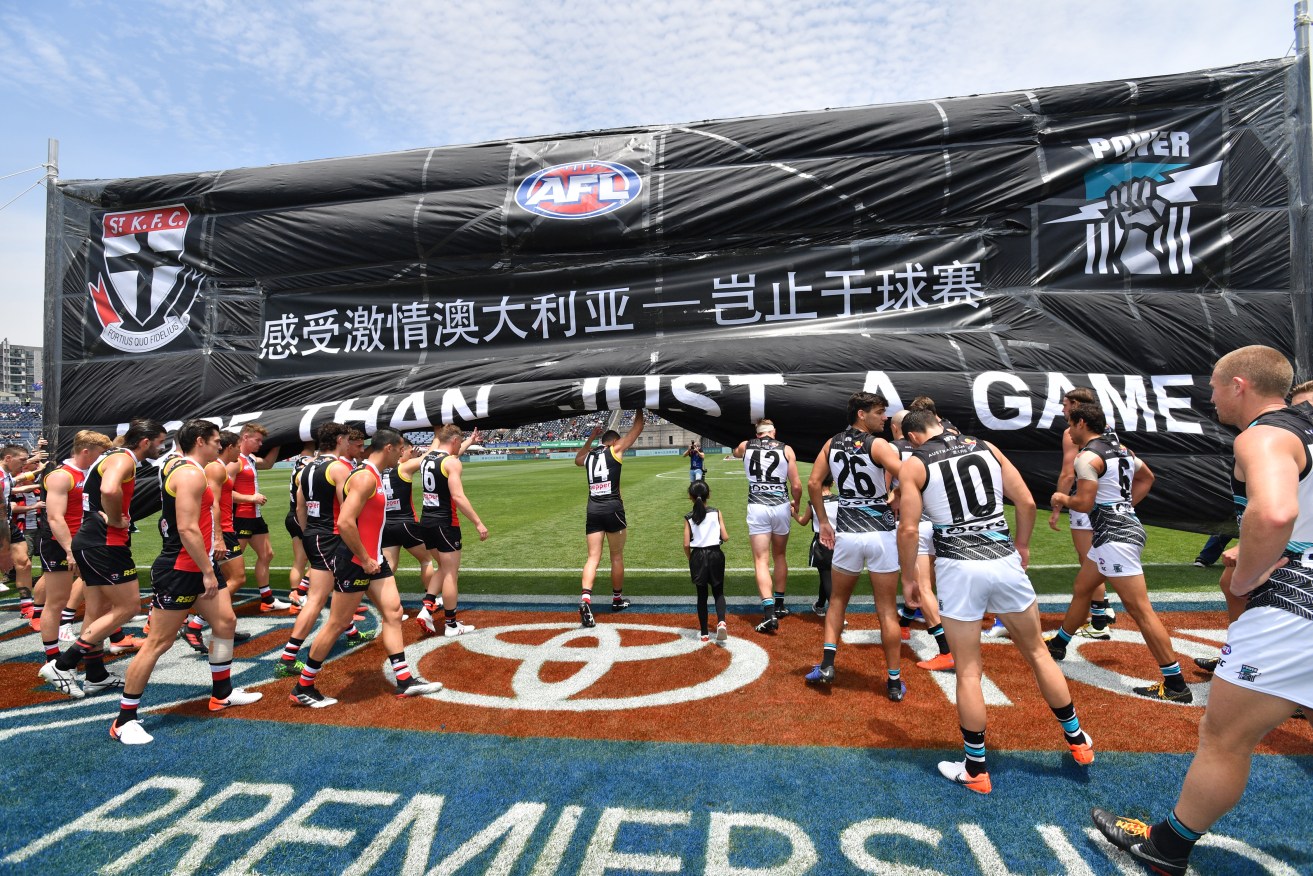
Players take the field before this year’s Shanghai fixture. Photo: David Mariuz / AAP
Port Adelaide, without a finals appearance since 2017 or victory since 2014, appears at a crossroad.
With coach Ken Hinkley publicly declaring his ongoing tenure hinges on a major round berth next year, there will be keen attention on how the team performs on the field.
Off-field, the high enthusiasm of the club’s landmark foray into China four years ago has dissipated somewhat as the novelty of the team’s annual adventure fades.
Just as with the Power’s crosstown rival Adelaide’s eSports venture, the project has left many supporters scratching their heads – if not questioning whether the entire enterprise represents a gigantic distraction for a club whose stated reason for being is to win premierships.
While the football media’s attention was on the smattering of young players who returned to the club to kick off pre-season training this week, the most significant signing of Port Adelaide’s off-season could prove to be the one that took place in Shanghai just this morning.
Zhang Tao (or Tony Zhang, in the anglicised version) is a career diplomat who has managed Austrade’s Qingdao office in Shandong Province and served as a Trade Commissioner at the Australian Embassy in Beijing, overseeing financial services, mining, energy and food and beverage.
In 2009 he was appointed as the NSW government’s Commissioner of Trade and Investment in Shanghai, charged with attracting billions of dollars of investment into Sydney and forging close ties with Chinese government at all levels.
His presentation to the board next month will be the first time he’s set foot inside an AFL club.
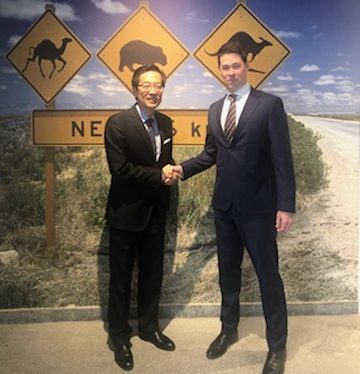
Port Adelaide’s China engagement manager Andrew Hunter (right) with the club’s new signing, Tony Zhang. Photo: Supplied
A high-powered signing, then, for a suburban football club – but one that could leave frustrated supporters bemused.
InDaily sat down with the architect of Port Adelaide’s China strategy, Andrew Hunter, who is today in Shanghai joining SA senator and federal Trade, Tourism and Investment Minister Simon Birmingham at the China International Import Expo.
Not only is China’s President Xi Jinping hosting 200+ Australian business exporters at @ciieonline but also discussions among #Trade Ministers on how to achieve stronger outcomes in @wto negotiations. Thank you for the welcome & the opportunities. #CIIE ?? ?? pic.twitter.com/LDRUJCzmfs
— Simon Birmingham (@Birmo) November 5, 2019
Hunter, who previously authored the former Weatherill Labor government’s Asian engagement policy platform, is promoting an upbeat story of the Power’s China project – a story of resilience in tough diplomatic terrain which, he insists, is about far more than an annual game of football.
Business development – that’s the reason why Port Adelaide is involved in China
InDaily: How is this China strategy playing out for Port Adelaide?
Andrew Hunter: The essence of [today’s] occasion will be for us to talk about the progress that’s been made over the last four years, specifically in respect to our last year’s financial result, where we returned about half a million dollars to the club’s bottom line. And that’s allowing us to, for the first time, put somebody on the ground in China in a full-time, commercially-oriented role, so that we can accelerate the really positive conversations we’re having at the moment.
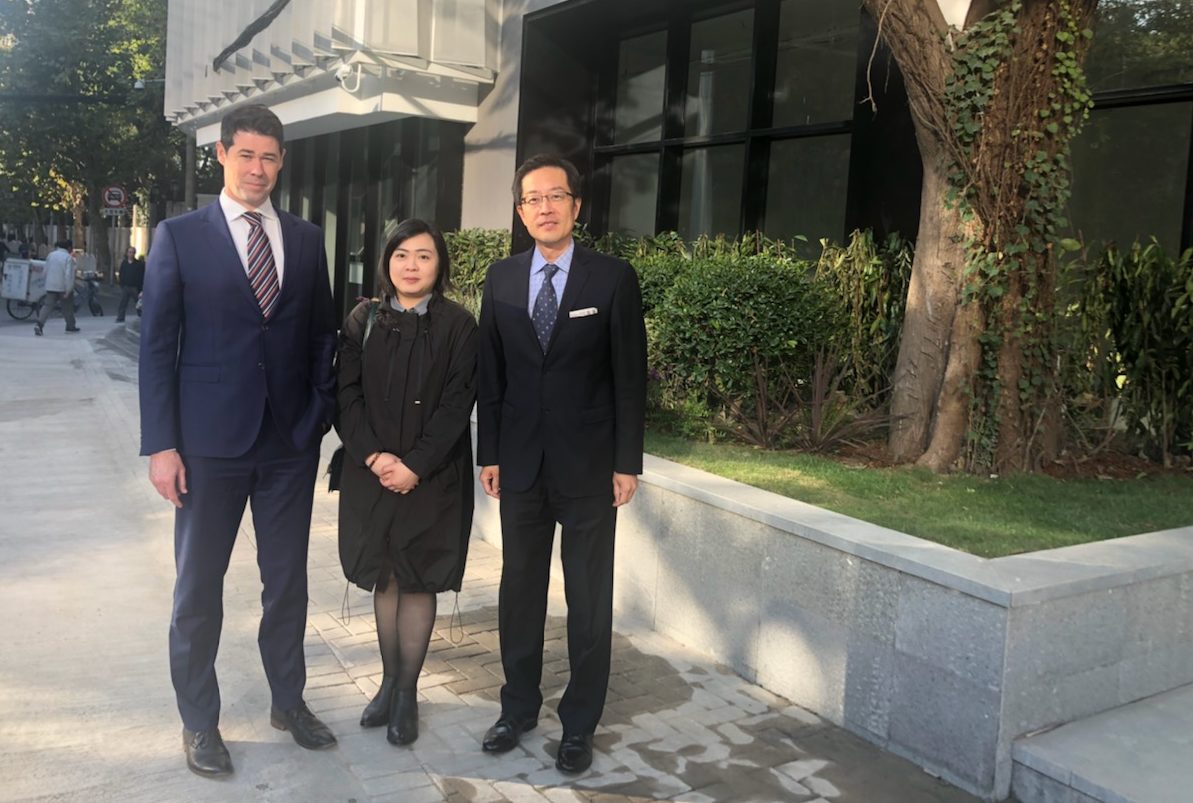
Hunter in China today with Zhang and the club’s executive partnerships manager Xu Nuo.
What does the role entail?
So at the moment, we have a small team and we execute the game, but we’re also doing business development – which is the reason why Port Adelaide is involved in China.
We’re profitable, and we’re returning a substantial amount of money to the club’s bottom line
We’ve had some success at that, and we’re building an extremely strong foundation now. We have some very strong partners: Shanghai CRED, Jincheng Group, PwC, the University of Adelaide… we’re profitable, and we’re returning a substantial amount of money to the club’s bottom line.
That said, we’ve got a really strong pipeline at the moment and we have a very acute awareness of where the business development opportunities are. And we believe that putting somebody on the ground in China with a familiarity and the capacity to follow up on conversations with greater regularity than having somebody such as myself travel to China every six weeks or so will accelerate and fully realise and maximise the potential of what we’ve assiduously built over the past four years.
We believe we’ve got the perfect person for us… not someone with a football pedigree [but] somebody who was born and raised in China, but with a very strong understanding of the Australian context because he’s worked in a commercial position previously for the Australian government. So he’s very familiar with both the Chinese and Australian context, very familiar with the Chinese and Australia mindset… but also if someone understands Australia, they do understand the role that sport can play.
We’re not selling sporting assets in China, which I think is one of the reasons why there has been some confusion around what Port Adelaide is doing, and the level of success that we may have had.
We’re essentially using the power of sport in Australian society to provide business solutions to Chinese companies that are active in Australia. This has been the essence of our success over the last four years. It’s been the reason why we’re successfully returning money to the club and are profitable at the moment.
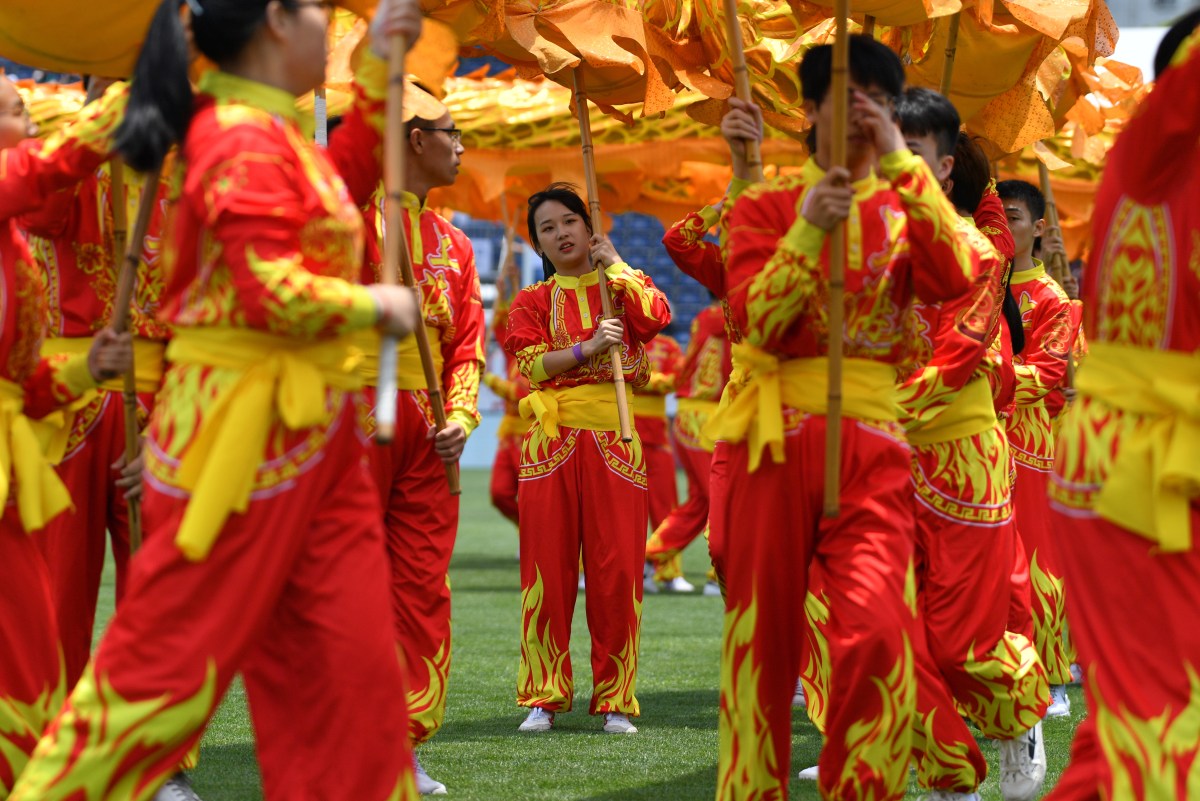
MATCH-DAY EXPERIENCE: Chinese performers warm up the crowd at Jiangwan Stadium before this year’s St Kilda clash. Photo: David Mariuz / AAP
So you said half a million dollars was returned into the club… where does that lie in terms of what you’d hoped to achieve by this stage?
I think it’s around the mark. We were profitable in 2016 in our China engagement, but a number of things happened from 2017 on. Firstly, we started playing the game [the annual AFL fixture at Jiangwan Stadium, twice against the Gold Coast Suns, and this year against St Kilda].
That takes an enormous effort for our club [CEO Keith Thomas has previously declared the event costs $4.5 million to stage].
We do believe that playing the annual game in China is important, and substantially adds to our credibility in this space. But it’s a resource intensive proposition, and we needed to ensure that we had the team that was able to execute that game.
There were also some really substantial changes in the regulatory context in China at that time.
From 2017 particularly, China started clamping down on capital outflows, [announcing] they would be looking very carefully about investments made in foreign countries, and they particularly identified the sectors of real estate and sporting investments.
So from that position, Port Adelaide’s role in China became far more complicated. We need to be far more careful with what we’re doing and there was, I guess, a greater caution around Chinese companies being involved in those sectors – and particularly in sport.
Around the same time, at the end of 2017, the bilateral relationship from that point traversed a really difficult moment.
[Australia’s relations with its biggest trading partner have been frosty in recent times, with local flashpoints including Beijing’s human rights abuses, attempts at foreign interference and detention of Chinese-Australian writer Yang Hengjun, while China has taken exception to accusations the country is trying to meddle in Australia’s political system, as recently as this week urging Canberra to dial down its public criticism.]
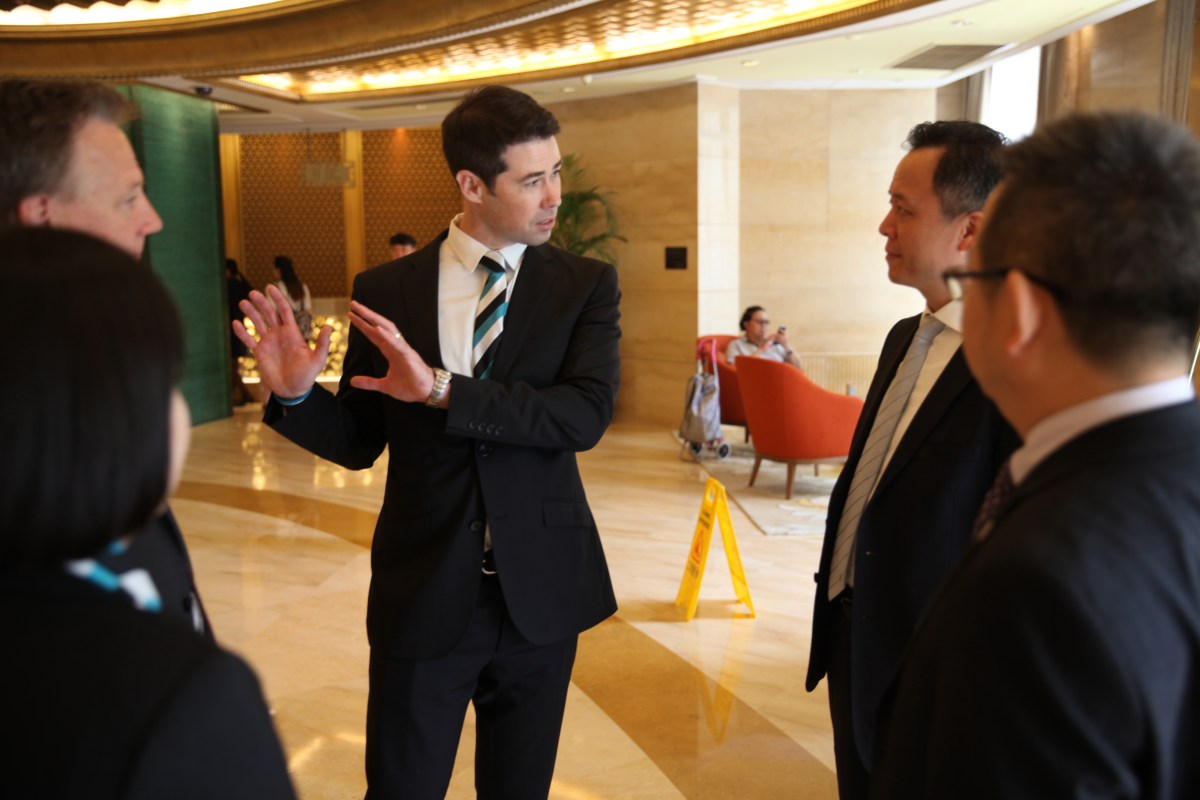
Andrew Hunter is the architect of Port Adelaide’s Chinese foray. Photo: Supplied
So it became far more difficult for us to work with Chinese companies that essentially will follow the lead of their government in most cases, and knowing that Australia was a country that was has been frowned upon because of the tension that existed in the bilaterals.
So 2017 and ’18 were difficult years… but we’ve pivoted, we’ve created new revenue streams and we’ve adjusted our strategy, and we’ve returned to a profitable position again this year.
Will the club as a whole be turning a profit this year? And if so, would they be doing that without the China capital?
It’s difficult to remove one part of club’s commercial activity from the whole. There is, of course, an opportunity cost from the investment that we’ve made in China, an investment in time as well as expertise. But that aside, my understanding is that the club has improved its financial position from last year, which is on the public record… and I think a great contribution towards the result has been the money that we’ve returned from our China activities.
I think it’s important to actually explain what we’re doing in this space, so that our members and supporters understand… that what we’re doing in China is contributing to the financial result, and I think will contribute far more strongly in the next couple of years…
The amount will increase. We have done the hardest work… we’ve developed a foundation, we’ve built it brick by brick. We’ve gone from ground zero in China, which is a country that has no understanding of Australian sport – they have no real need for another sport in China that isn’t an Olympic sport, they had no interest in it.
And we’ve done it in the most difficult circumstances imaginable, with dramatic changes in the regulatory context, which directly affected our business, and in a period of the last three years where the bilateral relationship has traversed a period of extraordinary tension.
The fact that we are now profitable again, and we’ve built that foundation, the hardest work has been done. And now we need to diligently work on building that figure year on year, so that those early difficult years, all of the trips that were made, all of the intellectual vigour that was put into actually developing this project in a very complex environment returns something that will hold the club in good stead for decades and decades to come.
The endgame certainly isn’t the match in China… we still would be doing what we’re doing in China without it
How does it sit next to the cultural brand Port Adelaide is trying to generate – a 150-year-old suburban club, with that sort of parochial wharfie mentality… a tribal, small community… and yet you’re out there doing things that some of your members don’t really understand in far flung parts of the world?
I think the reason why we’re sitting down together is so our members have a better appreciation of the detail and complexity of what we’re trying to do in China.
But we’ve done a lot in the last few months since the season’s finished to talk to our members, and the one resounding thing that has come out of those conversations with respect to China is they’re proud of what’s been achieved…
And I think, you know, you shouldn’t slice off or try to take a particular part of the character of the Port Adelaide club and Port Adelaide supporters [because] we, throughout our history, have pushed the boundaries and pushed the envelope as to what’s possible… we’ve been ambitious to try and present the club on the highest possible level.
That has taken the club to a position where it was extremely determined to compete in the national league and, on a commercial level, that’s been the driving force behind finding new frontiers, new areas where we can develop the club’s commercial interests.
So in my opinion, it’s entirely consistent with our history that we’re doing something like this. And when one considers the context of the Australian sporting landscape, it’s entirely necessary.
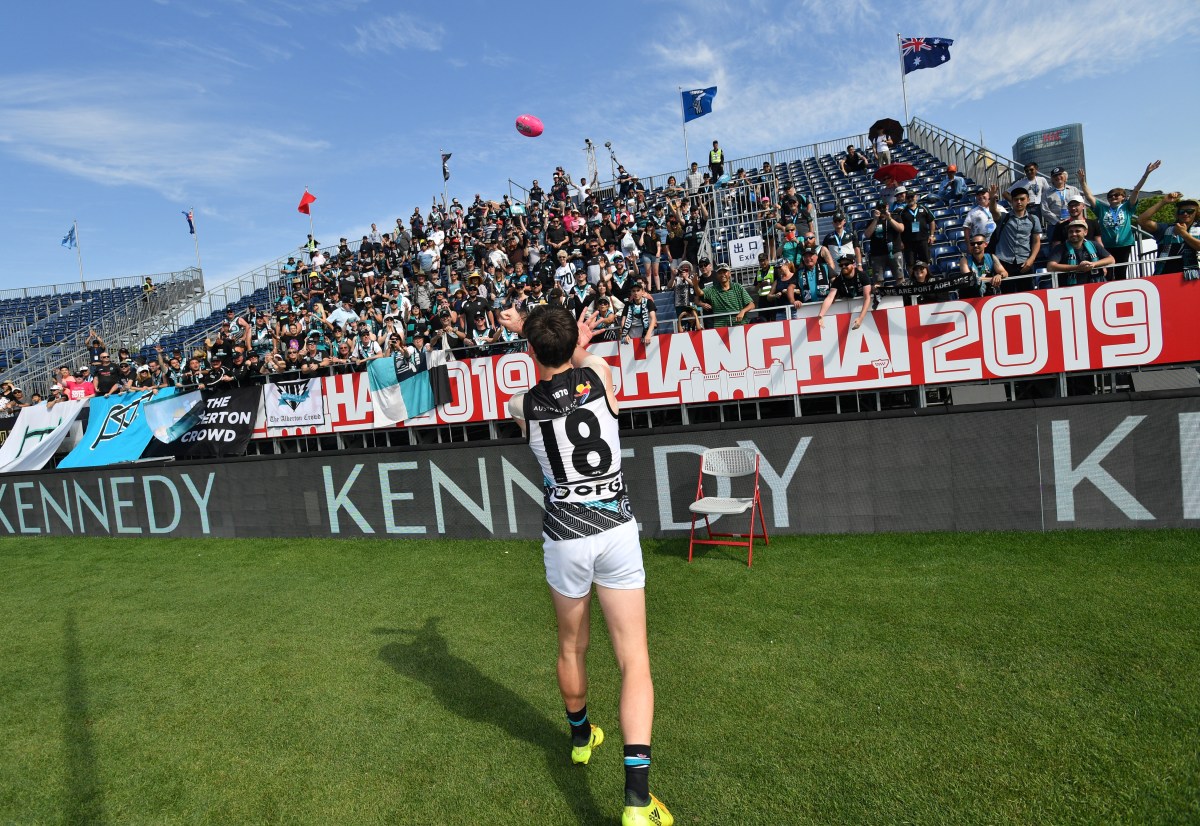
First-year player Zak Butters greets the crowd after Port Adelaides third win from three starts in China. Photo: David Mariuz / AAP
Is there is any aspect of the China game that is detrimental to the team’s efforts across the rest of the season? It’s unusual for an AFL team to make a trip of that magnitude… is the club confident that there’s no, sort of, collateral in terms of fitness, fatigue, mindset… that carries over into the latter part of the season?
Yeah, the club’s very careful to protect itself from that… I’d make a few points on that question. Firstly, I think it speaks very well about the football department that we prepare perfectly for that opportunity in China. I think that’s pretty obvious in the three games that have been played, that Port Adelaide has arrived in China with the whole club very well prepared for that.
Would Port Adelaide supporters think that we have a better chance of beating St Kilda in Shanghai or at Marvel Stadium?
Also, when you’re coming from a background that is not football, but a more international sport it’s very common for athletes to play in other countries and to back up within days of playing a particular game to compete in another country [Hunter is a former professional volleyball player who spent almost a decade plying his trade across Europe].
So Port Adelaide has the opportunity to play in China, which is different and certainly, you know, obviously the furthest road trip in the history of our sport… but in other sports it’s extremely common. And we prepare for it very well.
The question that I would ask is, would Port Adelaide supporters think that we have a better chance of beating St Kilda in Shanghai or at Marvel Stadium?
I think clearly Shanghai has a particular advantage for us… the club is familiar with it, but also because our football department prepares for that occasion with precision and a great deal of professionalism.
Is that fixture in some ways a distraction, or rather off to one side of what you’re actually trying to do in China? I mean, if you didn’t play the fixture, would you still be doing what you’re doing in China?
We still would be doing what we’re doing in China.
I think the game itself, though, offers the club an extraordinary opportunity to elevate itself. And if you look at the history of what we’ve done in China – and this too speaks to the pride of what’s been achieved – our commercial effort is complemented by the fact that Port Adelaide has, on a very regular basis now, been able to stand up with senior cabinet ministers and the Prime Minister and the Premier of China on different occasions. It adds to our credibility, it adds to the understanding of what we’re doing… it’s something that is greater than sport.
If you look at the sequence of those things… in 2016 [former] Prime Minister Malcolm Turnbull announced our intention to play a game in China – that was his first ever trip to China as Prime Minister, and the first event on his official schedule.
[Chinese] Premier Li Keqiang came to a Port Adelaide game and was hosted in the changerooms in 2017… Minister Ciobo [former Trade Minister Steve Ciobo] came to the [Shanghai] game in 2018, and that was after a period where, for eight or nine months, no Australian minister had been given a visa to actually come to China… but because of the game, Minister Ciobo was there.
And last year, the game itself became part of the Festival of Australia, which was again a concept that Port Adelaide was largely responsible for driving.
So when you think of all of these things combined, and the credibility that brings – particularly from the Chinese perspective – it’s a huge benefit for us, when ultimately we’re going to be competing with other sporting bodies, other sporting clubs like St Kilda, for relevance in this market.
And to be able to point to all of those occasions adds hugely to our credibility and makes those commercial outcomes more likely.
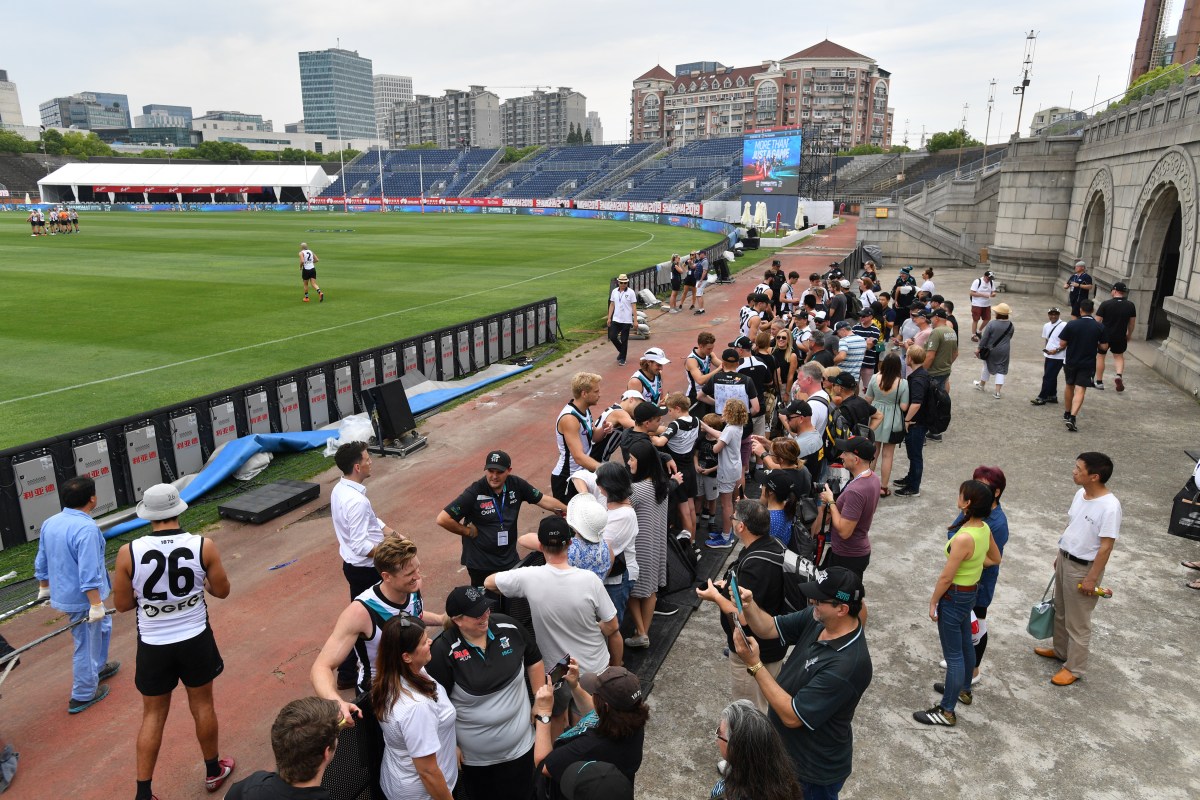
Power faithful at Adelaide Arena. Photo: David Mariuz / AAP
What is the benefit for a Gold Coast or a St Kilda in giving up a home fixture… other than, is it a million dollars a year that the club pays?
It’s not. It’s not even close to that…
I think from a St Kilda and Gold Coast perspective, they’re in a similar situation to us, whereby in Australia there are around 100 professional sporting clubs – about the same amount as there are in the United States, which has a much bigger population and much bigger market.
So these hundred sporting clubs in Australia are all on a competitive basis looking for the corporate dollar, looking for relevance…
St Kilda is in a similar position to us. They’re also competing with a number of clubs in Melbourne, so they’re able to have that point of difference because there is a strong Chinese diaspora in Melbourne, a strong community of Chinese Australians that they can appeal to.
They also have the great advantage of being a Victorian club, because Victoria has a representative office [in Shanghai] with around a dozen people working for them, that are very enthusiastic about supporting the only Victorian club that competes in China.
So I think it’s a great thing for them – and a great thing for Port Adelaide as well, because we can’t do this alone …we can’t play a game against ourselves in China.
It’s important for us that the other clubs do benefit from that, and in St Kilda I think we found a fantastic partner.
I have a responsibility towards the club… and our policy is that we’re not making political comments
You’re obviously a practiced diplomat… is the club careful to avoid the politics of China, such as we’ve seen permeate the sporting landscape in the US in recent weeks [the NBA recently went into damage control after Houston Rockets general manager Daryl Morey posted a tweet in support of Hong Kong protesters]?
The club, in reality, is keen to avoid politics – in Australia as well as internationally.
So this is something, a realisation, that has come to me over the years of working for Port Adelaide… as you know, I care deeply about Australian politics, but I’ve learned to curb those instincts in comments that are made publicly, because I have a responsibility towards the club, and ultimately the club is happy to – and needs to – work with governments of all colour.
So internally we have a policy around what each employee puts in the public purview. And our policy is that we’re not making political comments. That extends to China, as it does in Australia.
Is that an ethical struggle for someone such as yourself, from a political background?
It is sometimes, because I guess ultimately, whilst your place of employment and particularly a job like this is intrinsic to the person you are and informs your life on so many levels, ultimately, as a person, as an Australian, as a human being, you have opinions on a range of things and you’re wanting to make a modest contribution to a better world… that our children will inherit from us.
So it is sometimes… I don’t blame any person for taking a principled position on a particular area.
There are areas that are important to me – I follow what our fans are saying on occasion as well [and] some of our Port Adelaide supporters probably tire of me making a couple of comments on animal welfare and other things that are important to me [Hunter has written columns for InDaily and appears regularly in the Adelaide Review].
But as an employee of Port Adelaide Football Club, I have a responsibility of which I’m very aware and, you know, I take that responsibility very seriously.
I guess for most casual football observers – and probably most of your supporters – the endgame [of your efforts] is that match in China… but explain how this half a million-ish dollar profit comes about.
The endgame certainly isn’t the match in China… the match in China is an important opportunity for us to promote what Port Adelaide is doing in China, and to enhance our credibility on an elevated level – that’s the first point.
The second point is that from the beginning, when I first came to Port Adelaide in 2015, particularly at that point where the club was in a very strong position [after a preliminary final in 2014], we wanted the China engagement to be the cream on the top. So the idea was that we created new revenue streams without the attrition of traditional sporting assets.
So we had joint major sponsors, we had traditional assets that were selling… at the time we were wanting to create and develop business in such a way that it wasn’t reliant on and didn’t use our traditional assets.
So once again, if you look at Shanghai CRED as an example, that was an initial three-year agreement worth seven figures for each of those years. It’s been now extended by five years -and Shanghai CRED doesn’t use any of our traditional sporting assets. They’re not on the front of the jumper, they’re not in the coaches’ box, and so on.
So that’s one avenue that’s certainly still legitimate, and we believe that we’ll be in a position over the next couple of years to have another partner of about the same level and of a similar nature. And again, we’re in strong conversations at the moment… we believe that having a quality person on the ground in Shanghai will help aid and abet that effort.
We’re also very involved at the moment in business development in two particular sectors: one, the sports sector, and secondly, the education sector. So we have great partner in the University of Adelaide, who have signed a five-year agreement and now with Jincheng Group, which is a big group with strong interests in education in China.
And this is a sector that is seems to be immune, at the moment, to the issues of the bilateral relationship and is growing at an extraordinary rate… international education in Australia is worth about $32 billion a year, which makes it very important to our economy [and] in China it’s worth $70 billion a year.
So, in both countries, the growth is clear.
And you’ve got institutions, organisations and companies in both countries that are wanting to develop really meaningful relationships with each other. And Port Adelaide is working in that corridor between Australia and China to encourage those relationships and to value-add…
Port Adelaide is looking to play this match and to put ourselves in an elevated position to a very targeted audience… so what the TV cameras perhaps don’t pick up is the fact that of the 10,000 seats that are available in that stadium, over 3000 – over 30 per cent of those seats – are in corporate hospitality. The gala dinner, again, isn’t picked up – where 600 people pay $600 a ticket to be in what was described by AFL CEO Gillon McLachlan as the most high-powered room in Australian sport, outside the Olympic Room on AFL grand final day.
So for us, this is the most important aspect of playing the game in China… not to build a fanbase or a membership base, because that is a very long term play… we want to put ourselves in a position where we are on an elevated stage in front of potential partners of the Port Adelaide Football Club – that will help us commercially, which we will reinvest in football so that we can win our next premiership.
We have supporters that demand success… I think there are reasons to be positive about the future
It’s probably reasonable to say that Port Adelaide has been mediocre on the field over the past few years – finishing mid-table since 2014 – and arguably that’s reflected off the field as well. Why should a Port Adelaide supporter feel confident about the coming years?
I think for a number of reasons, but firstly to address the question of mediocrity: Port Adelaide is constantly striving – and restlessly striving – to be better in everything it does.
For example in China, you think of the fact Port Adelaide has stood beside Prime Ministers, Premiers, ministers, executed a game in China from 2017 with the AFL… these are extraordinary outcomes, and there’s nothing mediocre about what has been achieved in that space.
We’re developing new revenue streams in a country as complex and different as China, to deliver around half a million dollars to the club’s bottom line – there’s nothing mediocre about that.
Particularly when you consider that an organisation as well resourced as the NFL [in the US] has constantly tried to play official matches in China… since 2007, the China Bowl [a proposed pre-season exhibition match] was announced – and cancelled. In 2009, announced – cancelled.
They’ve now announced that they’re going to have another go at it in the future. I mean, if an organisation like that has struggled to actually achieve something that Port Adelaide has driven from an Australian context… I think these are outcomes which demonstrate the great capacity of the club and the boldness of its vision.
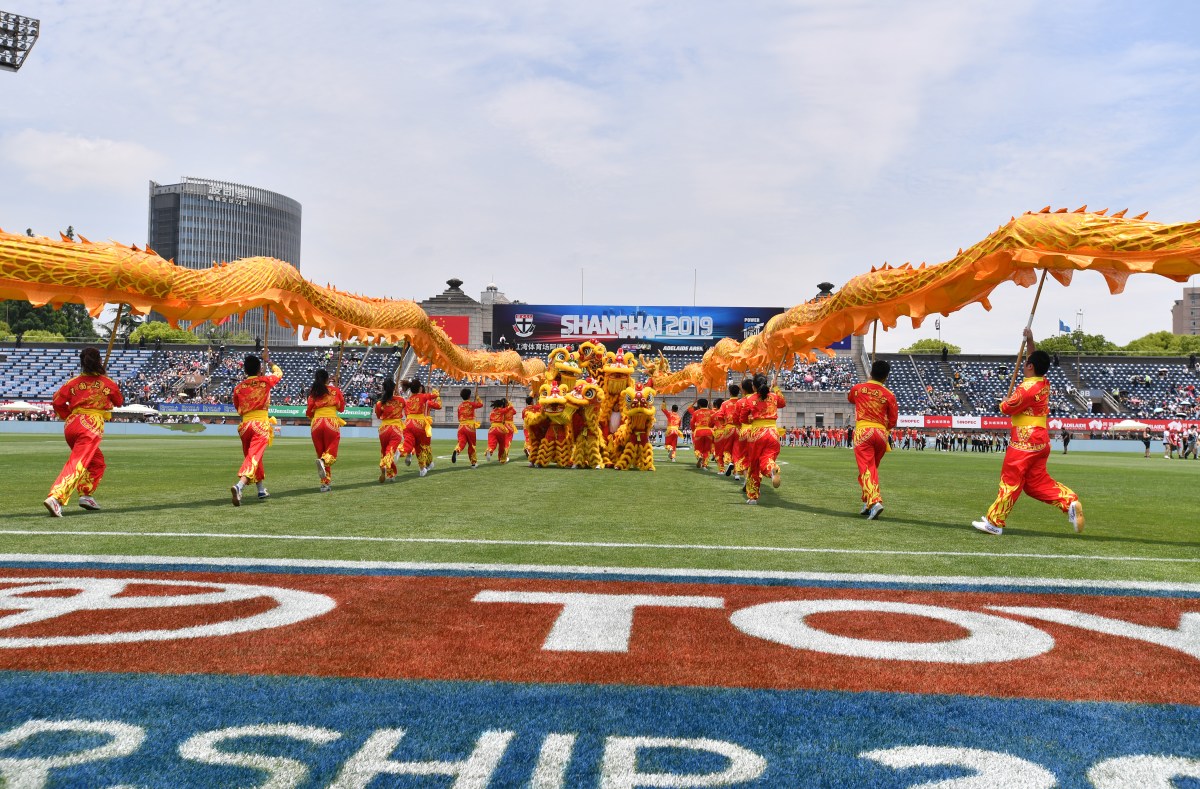
The Shanghai event is a platform – but not Port Adelaide’s “main game” in China. Photo: David Mariuz / AAP
And the game-day experience at Port Adelaide, to use another example, is still seen to be – according to the surveys of AFL members – the best game day experience in Australian sport.
And yet the numbers attending the games have diminished over the last couple of years.
We have supporters that demand success.
And again, I think there are reasons to be positive about the future for Port Adelaide…
In the quest to win our next premiership, the club made a decision at the end of 2017 that it wasn’t possible with the current group and they went back in and they’ve recruited some extraordinary talented young players that will be with the club for the next decade.
As a Port Adelaide supporter – and as a father of a young boy, Theodore, who’s brought up watching Port Adelaide games – the fact that he will grow up watching people like Rozee and Duursma play football for Port Adelaide, I think is an extremely exciting thing.
And I do believe that if we keep our minds on that quest for next premiership that success will come – and the club demands it.




